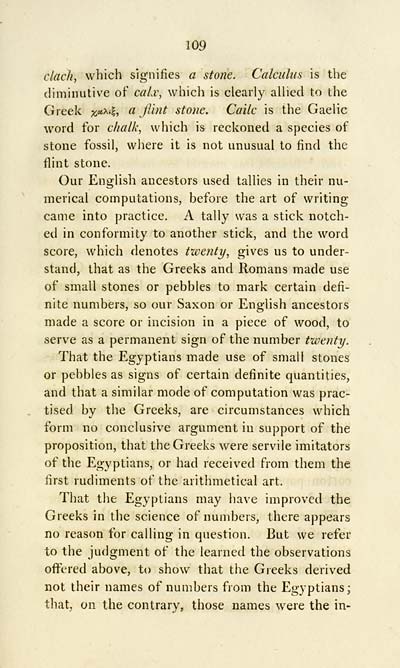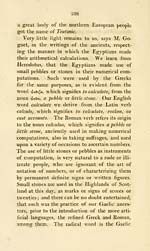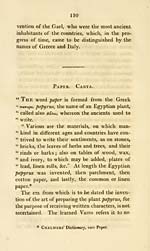Download files
Complete book:
Individual page:
Thumbnail gallery: Grid view | List view

109
clach, which signifies a stone. Calculus is the
diminutive of caLi\ whicli is clearly allied to the
Greek ;%j«»a4, a Jlint stone. Cailc is the Gaelic
word for chalk, which is reckoned a species of
stone fossil, where it is not unusual to find the
flint stone.
Our English ancestors used tallies in their nu-
merical computations, before the art of writing
came into practice. A tally was a stick notch-
ed in conformity to another stick, and the word
score, which denotes twenty, gives us to under-
stand, that as the Greeks and Romans made use
of small stones or pebbles to mark certain defi-
nite numbers, so our Saxon or English ancestors
made a score or incision in a piece of wood, to
serve as a permanent sign of the number twenty.
That the Egyptians made use of small stones
or pebbles as signs of certain definite quantities,
and that a similar mode of computation was prac-
tised by the Greeks, are circumstances which
form no conclusive argument in support of the
proposition, that the Greeks were servile imitators
of the Egyptians, or had received from them the
first rudiments of the arithmetical art.
That the Egyptians may have improved the
Greeks in the science of numbers, there appears
no reason for calling in question. But we refer
to the judgment of the learned the observations
offered above, to show that the Greeks derived
not their names of numbers from the Egyptians;
that, on the contrary, those names were the in-
clach, which signifies a stone. Calculus is the
diminutive of caLi\ whicli is clearly allied to the
Greek ;%j«»a4, a Jlint stone. Cailc is the Gaelic
word for chalk, which is reckoned a species of
stone fossil, where it is not unusual to find the
flint stone.
Our English ancestors used tallies in their nu-
merical computations, before the art of writing
came into practice. A tally was a stick notch-
ed in conformity to another stick, and the word
score, which denotes twenty, gives us to under-
stand, that as the Greeks and Romans made use
of small stones or pebbles to mark certain defi-
nite numbers, so our Saxon or English ancestors
made a score or incision in a piece of wood, to
serve as a permanent sign of the number twenty.
That the Egyptians made use of small stones
or pebbles as signs of certain definite quantities,
and that a similar mode of computation was prac-
tised by the Greeks, are circumstances which
form no conclusive argument in support of the
proposition, that the Greeks were servile imitators
of the Egyptians, or had received from them the
first rudiments of the arithmetical art.
That the Egyptians may have improved the
Greeks in the science of numbers, there appears
no reason for calling in question. But we refer
to the judgment of the learned the observations
offered above, to show that the Greeks derived
not their names of numbers from the Egyptians;
that, on the contrary, those names were the in-
Set display mode to: Large image | Transcription
Images and transcriptions on this page, including medium image downloads, may be used under the Creative Commons Attribution 4.0 International Licence unless otherwise stated. ![]()
| Early Gaelic Book Collections > Ossian Collection > Thoughts on the origin and descent of the Gael > (121) |
|---|
| Permanent URL | https://digital.nls.uk/82235896 |
|---|
| Description | Selected books from the Ossian Collection of 327 volumes, originally assembled by J. Norman Methven of Perth. Different editions and translations of James MacPherson's epic poem 'Ossian', some with a map of the 'Kingdom of Connor'. Also secondary material relating to Ossianic poetry and the Ossian controversy. |
|---|
| Description | Selected items from five 'Special and Named Printed Collections'. Includes books in Gaelic and other Celtic languages, works about the Gaels, their languages, literature, culture and history. |
|---|

